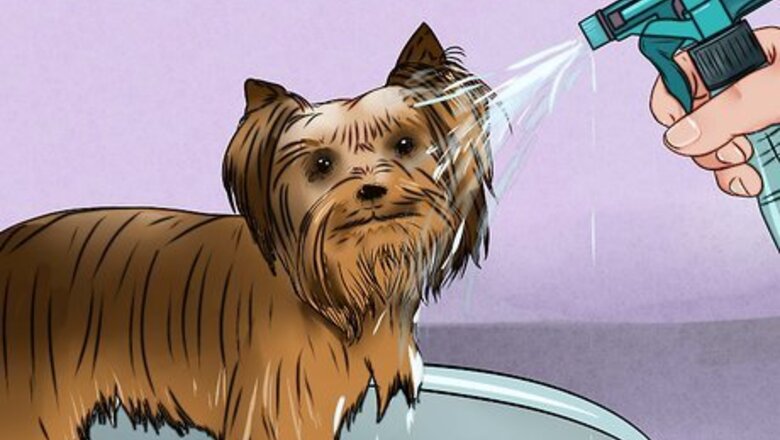
views
Brushing Your Yorkshire Terrier
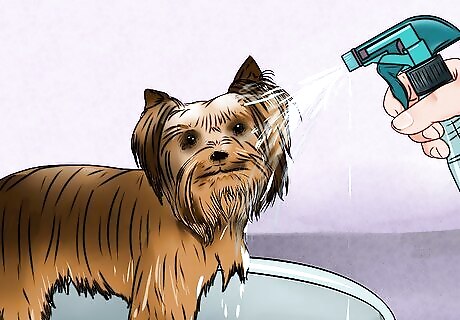
Condition your dog's coat. If your Yorkie's coat is dry or has a skin condition that requires moisturizing, buy a spritzing coat conditioner to use before brushing. This helps strengthen the coat and avoid damage from splitting or tearing hairs. If your Yorkie's coat is naturally oily, you can skip conditioning since it might just weigh his coat down. You can also make your own conditioner. Mix 5 parts water and 1 part dog coat conditioner in a spritzer bottle.
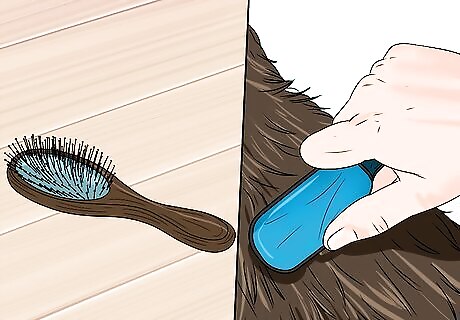
Brush sections of your dog's coat. Use a pin brush without rubber back, which has metal tip without plastic covering, as they tear the coat. Divide an area of your dog's coat into sections and brush from the root to tip with the lie of the hair. Brushing against the lie of the coat is uncomfortable and can lead to tangles. Proper brushing will condition your dog's hair by spreading natural oils throughout your dog's coat. A rubber backed brush can tear your Yorkie's coat. You might want to start brushing an area like the shoulder where your dog is less sensitive and ticklish.
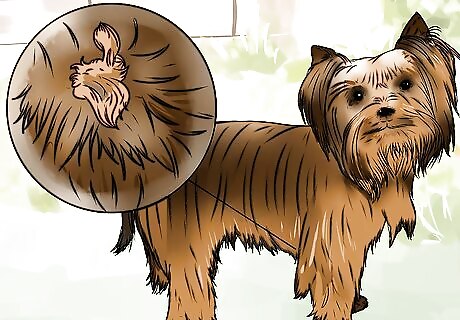
Work out any knots. If you find small knots, work away at them with your fingers, teasing the knot apart. If it is stubborn and can't be worked out, use a comb and slide it between the base of the knot and the skin. Position a pair of scissors above the comb and snip the knot away. The comb protects the skin and keeps you from accidentally snipping it when the knot is raised. Look for knots in areas where the fur rubs together such as the armpits, groin and behind the ears. Check under the tail to make sure there is no fecal soiling in the fur around the anus. If there is, consider bathing your dog, or snipping the soiled hair off if the soiling is extreme.
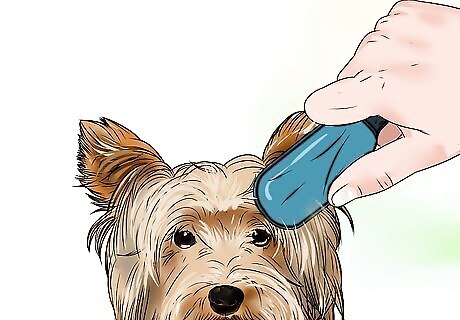
Comb around your dog's face and ears. Use a comb to gently comb out the fur of your dog's face and ears. Work slowly and pay attention to if your dog starts moving so you don't accidentally poke him in the eye with the comb. You can also clean any buildup from around the rims of your dog's eyes using eye wipes. Be careful so you don't get the wipe into the eye, which can sting.
Bathing Your Yorkshire Terrier
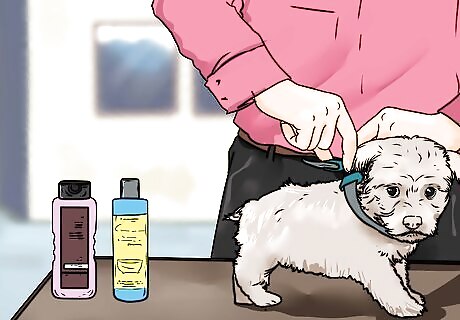
Prepare to bathe your dog. Remove any accessories your dog is wearing such as a collar, bows, or dog clothing. Set him on a comfortable spot on the floor or grooming table. If you use the floor, lay out a large, soft towel. This will also keep hair off the floor. If you use the grooming table, never leave him unattended in case he gets frightened and jumps down, which could lead to injury. Before your bathe your dog, make sure he's been properly brushed. Use a pin brush to completely brush your Yorkie and then use a comb to completely brush him again. This will prevent tangling.
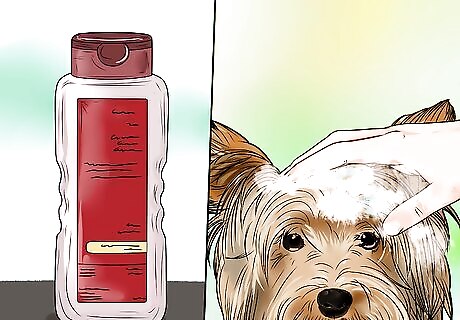
Wet and shampoo your dog. Starting at the top of your Yorkie's head, wet his body completely. Take care not to get any water directly into the eyes. Make sure you wet all the way back to the end of his tail. Squirt some shampoo into your hands and work a lather from the top of your dog's neck to the end of the tail. Shampoo the outside of the ears, the legs, the chest, belly, featherings (the fringe or longer hair), and the rest of the body. To shampoo the head, start at the top and work down to the muzzle. Choose a creamy dog shampoo that will make your Yorkie's coat silky and soft. Look for a tearless shampoo, especially to use on the head. Avoid using shampoo formulated for humans because the pH balance is different and could irritate your dog's skin.
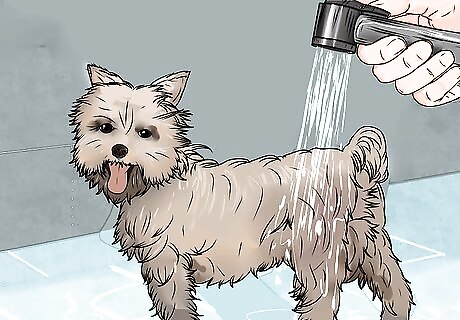
Rinse out the shampoo. Use warm, clean water and rinse the shampoo out of your Yorkie's coat for at least three minutes. Keep rinsing until all the suds are removed and the water runs clear. If you don't get all the shampoo out, the soap residue could irritate your dog's skin. It may be easier to rinse your dog in a sink. If your dog is larger, you can also set him in the tub to rinse, but he may be frightened by the larger space.
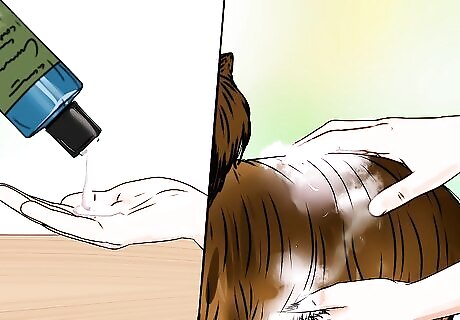
Condition your dog's coat. If you are a using conditioner, squirt a dollop into your hands. Smooth the conditioner over the dog's body, beginning at the top of the neck and working down to the end of the tail. Get the outside of the ears, the legs, the chest, featherings and the rest of the body. Let the conditioner set for 5 to 10 minutes before rinsing off. Rinse the conditioner off for about 2 to 5 minutes.
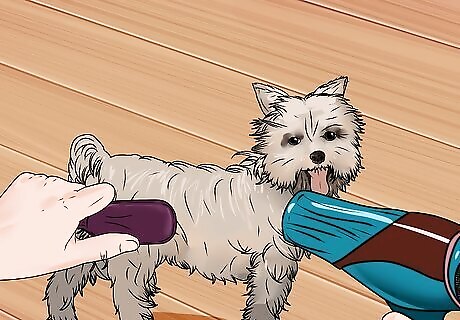
Brush and dry your dog. Let your dog shake the water off first. This can help to remove about half the water in his coat. Take a towel and rub gently all over the dog's body for about 20 seconds. By this point, your dog will still be damp, but no longer soaking wet. You can now take a pin brush and brush your your dog's coat. Repeat with a comb, but pay special attention to the featherings, ears, and tail. Comb these so that they sit straight. You can also use your pet dryer or a human one on the coolest setting possible (also placed at least 10 inches from the dog and constantly moving). Blow dry your Yorkie while combing him, so that the hair stays straight.
Caring For a Yorkie's Teeth, Nails, and Ears
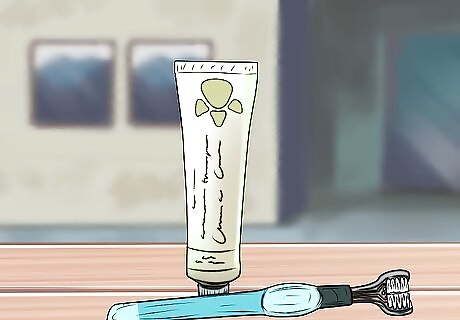
Prepare to brush your dog's teeth. Choose toothbrushes and toothpastes that are made for dogs. You may want to buy a tiny finger brush with plastic bristles (available at pet stores, catalogs, or from your veterinarian) which may be easier to use than a toothbrush. Clean the tooth brush or tiny finger brush by running it under hot water for a few seconds and rinsing in cold water for a few seconds. Do this before using it in your dog's mouth. Do not use human toothpaste because the high fluoride content can make your Yorkie sick if he swallows it.
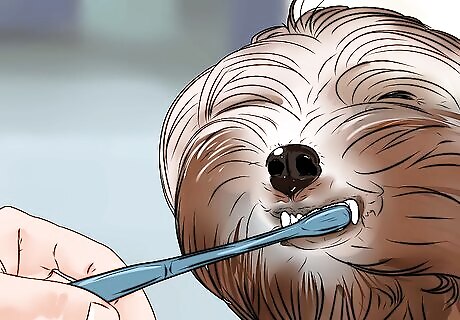
Brush your dog's teeth daily. Squirt a pea-sized amount of toothpaste on the toothbrush. Gently move your dog's lip upward so you can see the teeth. Rub the toothpaste on the teeth and don't worry about rinsing since dog toothpastes are designed for your dog to lick away. Yorkies are prone to tartar buildup on their teeth. This buildup can lead to gum recession and the teeth eventually loosening. Brushing is important to prevent tartar buildup and painful, costly dental surgeries.
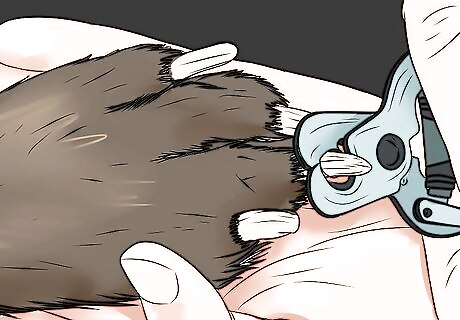
Clip your dog's nails. Take dog nail clippers and hold your dog's foot firmly in your hand. Pay attention to the shape of the nails and look for the quick. The quick is a blood vessel and nerve that appears dark. Avoid cutting this. Instead, only cut the tip of the nail. If you're unsure where the quick is or how far back to clip, try buffing the point off the nail with a coarse emery board. If you do accidentally cut into the quick, it may bleed a lot, but won't be fatal. You can stop the bleeding by covering it with a little styptic powder. If it's your first time clipping your Yorkie's nails, you may want someone knowledgeable to show you how to clip the nails. Or, it may just be helpful to have the person hold your dog while you do the trimming.
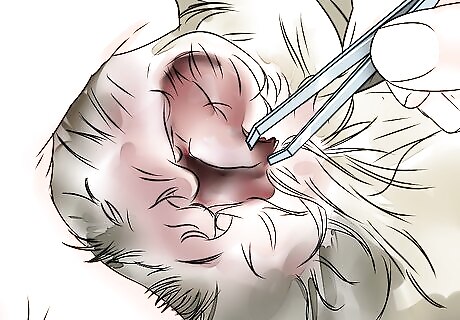
Tweeze inside your dog's ears. Take your tweezers and gently pluck the hair inside the ear. This is optional, as some argue it can make the ears sore and inflame the skin, causing infection. Others believe plucking can improve air circulation within the ear canal, preventing infections. Many veterinarians advise a middle path which is not to pluck unless your dog gets regular ear infections. In this case, plucking can help ear drops penetrate deeper into the ear canal.
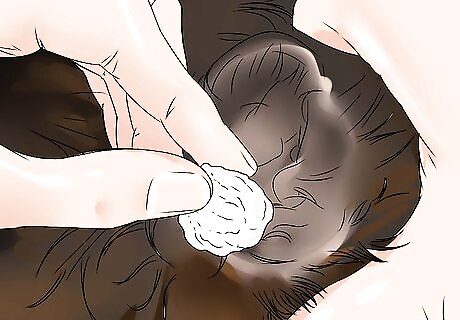
Clean inside your dog's ears. If you see wax, usually brown or black, you'll need to use ear wipes or an ear cleaner to remove it. Avoid putting water into your dog's ears, since it will soften the skin and could lead to infection. Instead, squirt a cleanser into your dog's ear and rub it in a circular motion. Place a cotton ball right under the flap and tip your dog's head toward it, so the solution drains out. Wipe out any remaining solution with a clean cotton ball. Never poke anything into the ear canal, even a cotton bud. But, don't be too afraid to clean your dog's ears. It's almost impossible to touch a dog's eardrum, let alone rupture it through routine cleaning. Dogs have "L" shaped ear canals, so as long as you clean straight downwards into the ear canal, the eardrum is not accessible.
Trimming Your Yorkshire Terrier
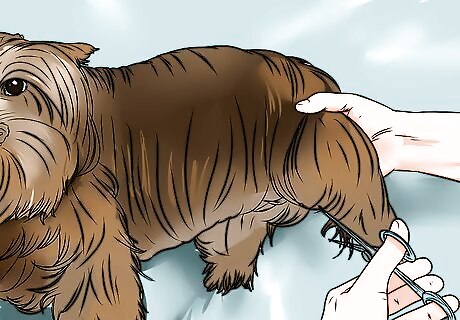
Trim the hair on your dog's feet. Choose grooming scissors that have a blunt end. This keeps the tips from piercing your dog if he moves unexpectedly while you're trimming. Gently, but firmly hold your dog's foreleg and clip the extra hair between the pads. Cut the hair on the front of the foot in a semi-circle, leaving the hair on top of the paws alone. Using other scissors may thin your dog's hair too much or create split ends. Since the hair on your dog's feet grows quickly, check the length every month to make sure it doesn't drag and interfere with your dog's walking.
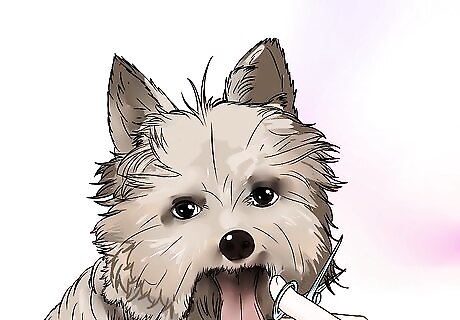
Clip your dog's featherings. Try to clip all the featherings, including the beard, at an equal length. You should occasionally trim the featherings, even if you're trying to grow out your Yorkie's coat. Just make sure not to much, if that's the case. Clipping your dog's featherings is a completely personal preference. You may want to find reference photos of looks that you like. For example, a popular cut is the "puppy dog clip", which has the top third of the ears clipped short so the ears stay pricked up and the hair along the jawline is clipped straight.
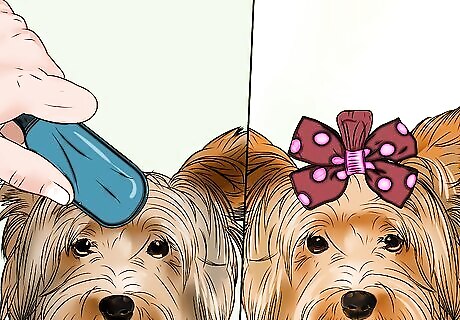
Groom your dog's top knot. To do this, brush the hair thoroughly so there are no tangles in the hair. Pull a section of hair on the top of your dog's head as though you're making a ponytail. Secure it with a comfortable band and tease the secured hair to make it appear larger. Gather it again on the top of the head and secure it with another band, clip, or bow. You may want to add a few drops of gel to keep hairs in place. If your Yorkie is a show dog, you'll need to groom his top knot.
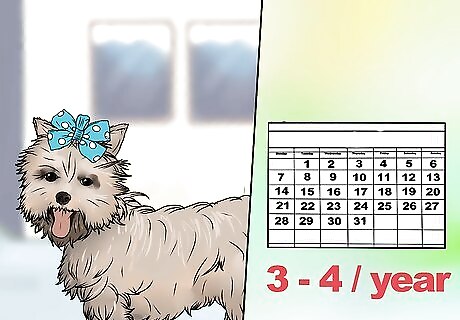
Have your dog professionally groomed every year. It's a good idea to send your dog to a professional groomer three or four times a year to keep him looking his best. If your dog is a show dog, he'll need a more complicated trim which involves growing the hair to floor length. A show Yorkie should be professionally trimmed every few months.










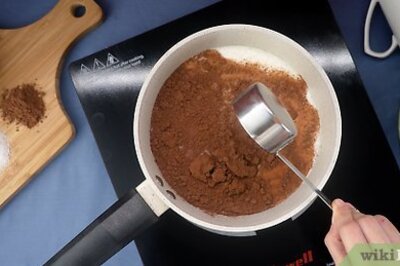



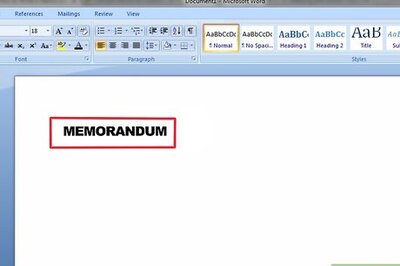
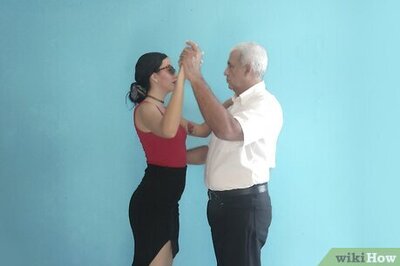


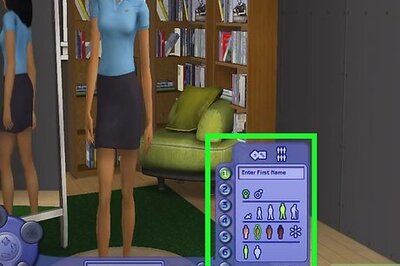

Comments
0 comment